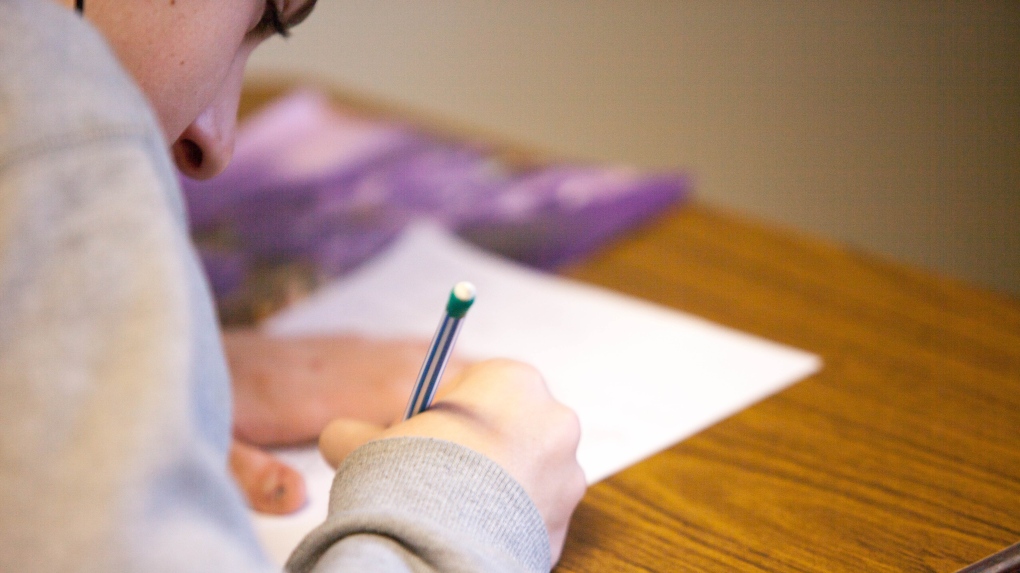'Ungrading': How one Ontario teacher is changing her approach to report cards
 Photo by Ben Mullins on Unsplash
Photo by Ben Mullins on Unsplash
An Ontario high school teacher plans to continue with an alternative method of grading her students in the new school year after an experiment last semester.
Stacie Oliver teaches at A.B. Lucas Secondary School in London, Ont. and recently began a new method of determining her students’ midterm and final grades.
Speaking on Newstalk 580 CFRA’s Ottawa Now with Kristy Cameron, Oliver said she and her students work together on grades twice a year, at midterms and at the end of the semester.
“The students propose their own grade at those two points and then they have to justify and prove to me that they have earned that grade,” Oliver explained.
“We have digital portfolios that they create throughout the semester that showcases not only their best work, but also all of the attempts they made along the way to get to that ‘showcase piece’, which is what they deem to be the best representation of their learning.”
Oliver says students must prove their work meets the expectations in the provincial curriculum.
“They understand the curriculum document very well and can speak to how their work meets and/or much of the time exceeds those expectations,” she said.
Known as “ungrading,” Oliver said the method is about changing the understanding of how to measure success in learning.
“There is lots of evidence that suggests that grades are very subjective,” she said. “It’s difficult to be able to objectively say, ‘This number is the number that truly captures the learning.’ What that might be in my classroom -- is that the same across another department, another subject area, another school?”
But the bigger aspect, Oliver says, is how students tie self-worth and identity to their grade number.
“What ends up happening is they don’t feel that everything is futile because they can continue to do it—whether it’s a task or practice a skill—they can continue to practice it until they’re satisfied that they’ve met that. I think that that’s really important and it does fuel students because they then want to learn and they want to get better,” she said.
Oliver said students in every classroom have differing attitudes on grades. She says the ungrading experiment allows students across that spectrum to take ownership of their learning.
“What ends up happening is they don’t feel that everything is futile because they can continue to do it—whether it’s a task or practice a skill—they can continue to practice it until they’re satisfied that they’ve met that. I think that that’s really important and it does fuel students because they then want to learn and they want to get better,” she said.
Oliver said she retains the authority, as teacher, to tell a student they haven’t justified the grade they may be arguing for, but says most students’ evaluations of their work are pretty close to her own.
“If I did have to change a grade, which was not a lot of the time, I was raising grades. I’ve had students tell me they don’t want to seem arrogant or think too highly of themselves, so they give themselves a lower grade than they might otherwise have done,” she said.
Oliver says her principal and school board approve of the grading scheme, and she plans to continue it in the fall.
“My principal has a strong interest in this thing we’re calling ‘ungrading’ and so he’s been very supportive right from the very beginning, as has the board, so it’s been great.”
CTVNews.ca Top Stories

Canadian gov't proposes new foreign influence registry as part of wide-spanning new bill
Prime Minister Justin Trudeau's government is proposing a suite of new measures and law changes aimed at countering foreign interference in Canada, amid extensive scrutiny over past meddling attempts and an ever-evolving threat landscape.
Boeing Starliner capsule's first crewed test flight postponed
The long-awaited first crewed test flight of Boeing's new Starliner space capsule was called off for at least 24 hours over a technical issue that launch teams were unable to resolve in time for the planned Monday night lift-off.
Teacher charged in historical sexual assault of Calgary teenage girl
Calgary police have charged a teacher with the alleged sexual assault of a teenage girl more than 20 years ago.
Winnipeg man admits to killing four women, argues he's not criminally responsible
Defence lawyers of Jeremy Skibicki have admitted in court the accused killed four Indigenous women, but argues he is not criminally responsible for the deaths by way of mental disorder – this latest development has triggered a judge-alone trial rather than a jury trial.
Man banned from owning animals after fatal Calgary dog attack
The owner of three Calgary dogs that got loose and mauled a woman to death in 2022 has been ordered to pay a $15,000 fine within one year and banned from owning any animal for 15 years.
East-end Ottawa family dealing with massive rat infestation
Residents in Ottawa’s Elmridge Gardens complex are dealing with a rat infestation that just won’t go away. Now, after doing everything they can to try to fix the issue, they are pleading with the city to step in and help.
Mediterranean staple may lower your risk of death from dementia, study finds
A daily spoonful of olive oil could lower your risk of dying from dementia, according to a new study by Harvard scientists.
An El Nino-less summer is coming. Here's what that could mean for Canada
As Canadians brace themselves for summer temperatures, forecasters say a weakening El Nino cycle doesn’t mean relief from the heat.
Newfoundland and Labrador latest province to tighten rules on Airbnbs
Newfoundland and Labrador is the latest jurisdiction to bring in stricter rules for short-term rentals, with a coming set of regulations that will force operators to register with the provincial government.

































